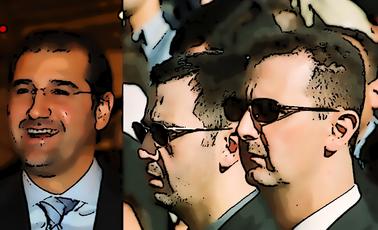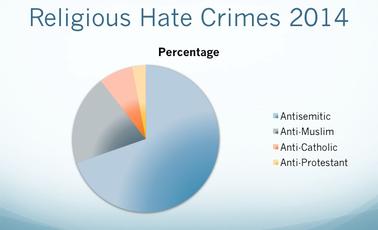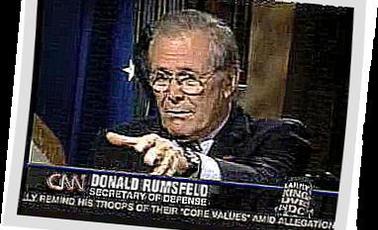By Juan Cole | (Informed Comment) | – –
The revelation in the leaked Panama Papers that Mossack Fonseca and Swiss bank HSBC serviced the companies of corrupt Syrian billionaire Rami Makhlouf (first cousin of dictator Bashar al-Assad) long after the US imposed sanctions on him is a reminder of why Syrians revolted against the regime in 2011 in the first place. Makhlouf was said to be worth $5 billion (likely more than Donald Trump) before the revolution, and to have dominated 60% of Syria’s economy. Below is something I wrote about the political economy of Syria’s revolution, which I never published– but it makes even more sense, I think, in view of the Panama Papers.
 Rami Makhlouf & Bashar al-Assad
Rami Makhlouf & Bashar al-Assad
P.S. The original cover image for this posting ws of Ribal al-Assad, a dissident member of the clan who has spoken out forcefully against corruption; it was extracted by a plug-in from the video interview cited below.
In 1963 the secular, Arab nationalist and socialist Baath Party came to power in Syria. Conflicts within the ranks of the party, which had military and civilian wings, kept the country unstable until 1970. In that year, an Air Force general, Hafez al-Assad made a coup. A member of the Alawite, Shiite minority that comprises about ten to fourteen percent of the population, al-Assad turned the Baath Party into a mechanism for dealing with Syria’s transformation from a largely rural, peasant society to a majority urban one. He reversed earlier Baath hostility to the agricultural business classes, allowing a vigorous private sector in the countryside. The public sector under his version of the Baath Part concentrated on organizing small-holding peasants and extending irrigation in the Ghab and the Euphrates Basin. The Baath building of dams and waterworks endeared it to small-holding rural Sunni Arabs, and over time incomes rose and cities expanded modestly. The regime was not universally popular, and in the small cities at the center of the country a powerful Muslim Brotherhood opposition flourished, with a class basis in businessmen, shopkeepers and artisans hostile to secular Baath socialism. In 1982, al-Assad brutally crushed a Brotherhood uprising in Hama, killing thousands.[i]
By the 1980s the gains from the Baath Party’s agricultural policies had reached a plateau. Economic and other discontents burgeoned. Syria’s government embarked late in that decade on a privatization program, and during the 1990s the percentage of the non-oil industrial economy in private hands nearly doubled from 45 to 82 percent. Syria entered the new millennium no longer a socialist economy. The al-Assad clan benefited from the turn to a new entrepreneurial spirit. The president’s brother Jamil, for instance, went into the import-export business and came to dominate the Mediterranean port of Latakia. He developed a relationship with semi-criminal elements among the dock workers and underground of the city, and deployed them in a protection racket in the port. Also drawn from his Alawite ethnic group, they were known as the “specters” (shabiha), and went on to engage in smuggling (especially tobacco) and occasionally to challenge the police.[ii]
Hafez al-Assad had designated his son Basil, head of presidential security, to be his successor, the first of the republican princes to prepare to come to power. Basil’s death in an automobile collision in 1994 caused Hafez al-Assad to designate his second son, Bashar, as the next president for life instead. Bashar was then studying ophthalmology in Britain (he only lived there 18 months), and his soft-spoken, timid manner did not suggest he would be a decisive leader. He admitted he was a fan of Phil Collins’s music, and had enjoyed making home videos as he came of age in Damascus. He succeeded to power in 2000, in part because influential Baath generals and politicians preferred another al-Assad to seeing one of their rivals become president.[iii]
Bashar al-Assad was unable effectively to address the economic problems of the country. Some of his difficulties were geopolitical. After a brief honeymoon with the United States from 2000 through 2002 (which included post-September 11 help in detaining, interrogating, and torturing al-Qaeda suspects), relations increasingly soured after Bush’s invasion of Iraq. Al-Assad’s Syria attracted the ire of Western hawks and the Neoconservatives. He was allied with Iran, with which Washington had increasingly bad relations after 2003. He proved unable or unwilling to police his long border with American-dominated Iraq (through which Sunni Arab, anti-American guerrilla groups infiltrated that country). He paid lip service, at least, to supporting the Rejectionist forces in the Israeli-Arab conflict, i.e. Lebanon’s Hizbullah and the more militant Palestinians. In December, 2003, Congress passed and Bush signed the Syria Accountability Act. Likewise, France joined the US on the UN Security Council in objecting to the continued Syrian occupation of and meddling in Lebanon. Al-Assad’s Syria found itself blocked from favorable trading terms in Europe and the United States. The full impact of such sanctions can be seen if we compare Syria after 2002 to Turkey, a NATO member, where the Islamically-tinged government of the Justice and Development Party vastly expanded trade and industry from 2002 because of its special tariff treatment by the US and the EU.
Al-Assad was initially young and inexperienced, and faced an entrenched Baathist bureaucracy suspicious of his experiences in Britain (though these were quite limited). He announced on coming to power that he would allow private banks to operate in Syria. He may have been influenced by his British-born wife, Asma al-Assad, who had worked as a broker at J.P. Morgan on Wall Street before she married. It took years for this decree to be implemented. Political scientist David Lesch interviewed her about the long delay in moving to private banking: “We have not had private banks in Syria for 50 years. Our public banks are not functioning…. We have staff who do not speak English, who do not have computers. So we are on a very, very basic level. …We had no idea how to do this. We don’t have the experience.”[iv] Over time, private banks began operating, though the six public banks continued to be dominant, and Western sanctions hurt some of those.[v] From 2005, al-Assad implemented his New Social Market, which added on a private sector to previous socialist institutions and allowed a new class of boisterous entrepreneurs to transform downtown Damascus.[vi] In 2009 a stock market was opened. The new private sector was not enough, however, to create even a fraction of the new jobs demanded by Syria’s Millennials, or to jumpstart the economy, and cronyism ensured that it functioned mainly to make wealth “trickle up” to the small elite. From 2005, the regime increasingly reduced subsidies, which hit the poor and working classes hard. On top of all that, the zeroes witnessed the beginnings of a severe drought in Syria, which deeply harmed farmers and the small towns that served as their initial distributors. If the Baath Party had been relatively good at water management and incorporated the rural Sunnis in the 1970s, it increasingly failed on both of those scores under Bashar. Either the challenge was too great, or the high Baath officials by then had other priorities (especially making billions through corrupt deals in the growing urban sector).[vii]
By 2004, Syria’s per capita gross domestic product was, in nominal terms, only $1,190 a year—half that of neighboring Jordan, a fourth that of Turkey, and a fifth that of Lebanon. Six years later, in 2010– on the eve of the outbreak of massive protests, the per capita GDP was still less than $3000 a year (124th out of 183 countries ranked), whereas neighboring Turkey’s was nearly $11,000 (61st), according to the International Monetary Fund. That is, in 2010 Syria was similar in this regard to Honduras and the Congo, whereas Turkey was more in the neighborhood of emergent economies such as Malaysia and Brazil. By the outbreak of protests in 2011, the poverty rate in Syria had climbed to something between 11 and 30 percent, depending on how it was measured.[viii]
Syria, like many other Arab countries, has difficulty growing its economy faster than its population. Its population growth rate remains relatively high, at 2.4 percent per annum, which will lead, if it remains unchanged, to a doubling of the national population in roughly 30 years, from 22 million to 42 million. That is, it will go from being about as big as today’s Florida to being more populous than today’s California (or in European terms, from being somewhat larger than the Netherlands to nearly as populous as Spain). Because the population growth rate was even higher in previous decades, Syria’s labor force grows 4.5 percent a year, adding nearly 300,000 would-be workers. In the youngest cohort, from 15 to 24, unemployment ran as high as 70 percent before the revolution broke out. Because poverty has increasingly caused teenagers and even children to drop out of school to work, illiteracy has actually been rising in the past two decades.[ix]
Governance in Syria under the Baath Party resembled the rings of an onion. The outer ring was the party, which incorporated Sunni businessmen and farmers, Christians, Druze (an esoteric Shiite sect), and the Alawites (another esoteric Shiite sect). The upper echelons of the party and the officer corps were disproportionately dominated by members of the minority Alawite sect. (The Alawite form of Shi’ite Islam has more folk elements and is less bookish, clerical and formal than the Twelver Shiite branch that dominates Iraq and Iran). The very inner circle was the al-Assad extended family or jama`at al-Assad. The al-Assad clan had opportunities to benefit from insider trading practices, given that they controlled government economic policy, and to receive business licenses and contracts. Already in the time of Hafez al-Assad, his propensity for promoting his friends and relatives inspired other members of his junta to do likewise. His longtime foreign minister and then vice president, `Abd al-Halim Khaddam, the informal viceroy of Lebanon, developed front companies in that country. He became a fixture in Beirut night clubs. He developed a close relationship to Lebanese-Saudi billionaire Rafiq al-Hariri, who made a gift to him of one of Aristotle Onassis’s former apartments in Paris and set him up in the telecommunications business. Hariri also brought Khaddam’s two sons into business ventures in Saudi Arabia, where he had made his money.[x] Hafez al-Assad’s Sunni minister of defense, Mustafa Talas (usually spelled Tlass in the Western press), had one son who became a big businessman, Firas. Firas had extensive holdings in real estate, food distribution, and banking, and was said to among the richest men in the country. The other, Manaf, became a general in the army (he defected to the opposition in July, 2012).[xi]
The rising business class in the Syria of the zeroes was hardly, however, confident or loyal to the regime that fostered it. The secretive and conspiratorial mindset of the Baath Party ensured that those who became wealthy were often under suspicion of corruption, that is, of stealing from the regime. In 2009, a Syrian newspaper published a list of Syria’s one hundred wealthiest businessmen, conveniently omitting some prominent relatives of the president, and even the names of the owners of the newspaper itself. The edition was said by the US chargé in Damascus to have sent chills up and down the spines of the families profiled, who were sure that the Syrian tax authorities would use it as an excuse to look into them. Most were probably nouveaux riches, with the old Baathist monied families excused from the ignominy of being discussed in public. The year before, a high security aide to the president had been killed in the port of Tartous by sniper fire while the president was out of country, and, when searched, the basement of one of his residences yielded $60 million. Periodic anti-corruption drives caught even those related to the president. A distant cousin of the president was arrested in 2009 for possibly abusing his position in the customs administration. The same year, a prominent Sunni client of the regime given the bid on key internet services was arrested after he made little progress in providing them, after pocketing the government’s payment.[xii]
If the sons of courtiers could do well, denizens of the presidential palace were even more favored. The brother of the president, Gen. Maher al-Assad, commander of the Republican Guards and of the Fourth Armored Division, was accused by dissidents of laundering money through agents in Lebanon for Iraqi Baathists. The “Youth of Rage” charged him in spring of 2011 with using businessman and media mogul Mohammad Hamsho as a corrupt silent partner (some alleged that Maher had a popular private television station closed so that Hamsho could open his own and garner the advertising revenue instead). They also accused him of hiding his ill-gotten gains in Swiss bank accounts.[xiii] Foremost among the new generation of Syrian crony capitalists is Rami Makhlouf, first cousin of Bashar on his mother’s side. The Makhloufs are an Alawite family that initially served the al-Assads in the security forces. Then in the 1990s, the patriarch of that branch of the family, Muhammad Makhlouf, had had to be brought in as a silent partner in the private Real Estate Bank (REB), which by the late zeroes was said to earn over $110 million a year – “largely from its monopoly on processing credit card and ATM transactions.” [xiv] At the height of his prominence, Muhammad’s son Rami Makhlouf’s holdings included monopoly corporations or semi-monopolies in construction, oil, airlines and airport concessions, real estate, telecoms and import-export. He was known to use his connections to the regime to close down others’ lucrative projects, using thugs, and then buy them for a song. [xv] He and his clan were alleged to be worth $5 billion in a country where the annual gross domestic product in nominal terms in 2011 was $59 billion. One dissident member of the al-Assad family, Ribal, characterized him as owning three-fourths of Syria.[xvi] Makhlouf is famed for sharp business practices that depended on his access to power. For instance, he went into the wireless telephone business with Orascom, an Egyptian concern, and when he decided to take over Orascom’s shares, he allegedly had the company chased out of the country.[xvii] The “Youth of Rage” charged that the resulting company, called “Syriatel,” proved a bonanza that was shared with Gen. Maher al-Assad, the president’s brother.
The pinnacle of power and wealth was Bashar and his immediate circle. The style of life of the palace was so opulent and cocooned that during the worst fighting of 2011 and 2012, first lady Asma al-Assad was obsessed with ordering gilt furniture, chandeliers and jewelry over the internet.[xviii] Her buyer confirmed in July of 2011 that she had acquired: “-1 Turquoise with yellow gold diamonds and small pave on side: – 1 Cornaline with yellow gold diamonds and small pave on side; – 1 Full Black Onyx with yellow gold diamonds and small pave on side; – 1 Amethyst with white gold diamonds and small pave on side.”[xix]
[i] Raymond Hinnebusch, Syria: Revolution From Above (London: Routledge, 2001); Patrick Seale, Asad: The Struggle for the Middle East (Berkely: University of California Press, 1990).
[ii] Bashir Zayn al-Abidin, “Al-Hukuma al-suriyya wa ‘muharabat al-fasad,” al-Bayan, April 4, 2011 at http://albayan.co.uk/article.aspx?id=822
[iii] Joshua Stracher, “Reinterpreting Authoritarian Power: Syria’s Hereditary Succession,” The Middle East Journal 65. 2 (Spring 2011): 197-212.
[iv] David W. Lesch, “The Evolution of Bashar al-Asad,” Middle East Policy 17. 2 (Summer 2010): 70-81.
[v] “Part 1: Syria’s Changing Financial Landscape,” Chargé d’Affaires Maura Connelly, Damascus, to Secretary of State Hillary Clinton, May 11, 2009, Wikileaks, at http://wikileaks.org/cable/2009/05/09DAMASCUS327.html
[vi] Bassam Haddad, Business Networks in Syria: The Political Economy of Authoritarian Resilience (Palo Alto: Stanford University Press, 2012).
[vii] Bassam Haddad, “Syria’s Stalemate: The Limits of Regime Resilience,” Middle East Policy
Volume 19, Issue 1 (Spring 2012): 85–95.
[viii] Fayez Sara, “Poverty in Syria: Towards a Serious Policy Shift in Combating Poverty,” (London: Strategic Research and Communications Center, 2011) at https://www.cimicweb.org/cmo/ComplexCoverage/Documents/Syria/Poverty_in_Syria.pdf
[ix] Alistair Lyon, “Syria grapples with surging population,” Reuters, June 3, 2010 at http://www.reuters.com/article/2010/06/03/us-syria-population-idUSTRE6522FS20100603; SØren Schmidt, “The Missed Opportunity for Economic Reform in Syria,” Mediterranean Politics, 11:1 (2003), 91-97
[x] Gary C. Gambill, “Dossier: Former Syrian VP Abdul Halim Khaddam,” June 2, 2006, Global Politician, at http://www.globalpolitician.com/21829-syria
[xi]For an overview of high Syrian officials of the past decade see “A Lion’s Den: A Guide to Assad’s Regime,” al-Arabiya, January 2013 at http://english.alarabiya.net/lionsden/
[xii] “Corruption investigation rattles business community,” Chargé d’Affaires Maura Connelly, Damascus, to Secretary of State Hillary Clinton, April 9, 2009, Wikileaks, http://wikileaks.org/cable/2009/04/09DAMASCUS274.html
[xiii] Shabab al-Ghadab (Syria), “Qissat fasad al-shaqiqatayn Bashshar wa Mahir al-Asad wa ibn khalihima Rami Makhluf,” al-Tahaluf al-Watani al-`Iraqi , April 22, 2011 at http://www.iraqipa.net/04-2011/21-30/a9_22apr2011.htm
[xiv] “Part 1: Syria’s Changing Financial Landscape,” Chargé d’Affaires Maura Connelly, Damascus, to Secretary of State Hillary Clinton, May 11, 2009, Wikileaks, at http://wikileaks.org/cable/2009/05/09DAMASCUS327.html
[xv] “Maximizing the impact of Rami’s Designation,” Economic Counselor Todd Holmstrom, Damascus, to Secretary of State Condoleezza Rice, January 31, 2008, Wikileaks, http://wikileaks.org/cable/2008/01/08DAMASCUS70.html; Khaled Yacoub Oweis, “Syria’s Makhlouf owes fortune and infamy to Assad,” Reuters, June 16, 2011.
[xvi] “Muqabalat Ribal al-Asad,” France24 Arabic, May 6, 2011 at youtube
[xvii] Schmidt, “Missed Opportunity,” p. 95.
[xviii] Robert Booth and Luke Harding, “Gilded lifestyle continued for Assad coterie as conflict raged in Syria,” The Guardian, March 14, 2012 at http://www.guardian.co.uk/world/2012/mar/14/gilded-lifestyle-assad-coterie-conflict
[xix] “Alia Kayali” [a.k.a. Asma al-Assad]/ Amal al-Akhras, 19 July 2011, hacked email published in The Guardian, March 14, 2012 at http://www.guardian.co.uk/world/2012/mar/14/bashar-al-assad-syria3
—–
Related video:
Euronews: Panama Papers show how Syria and North Korea ‘evaded sanctions’




 Rami Makhlouf & Bashar al-Assad
Rami Makhlouf & Bashar al-Assad 

